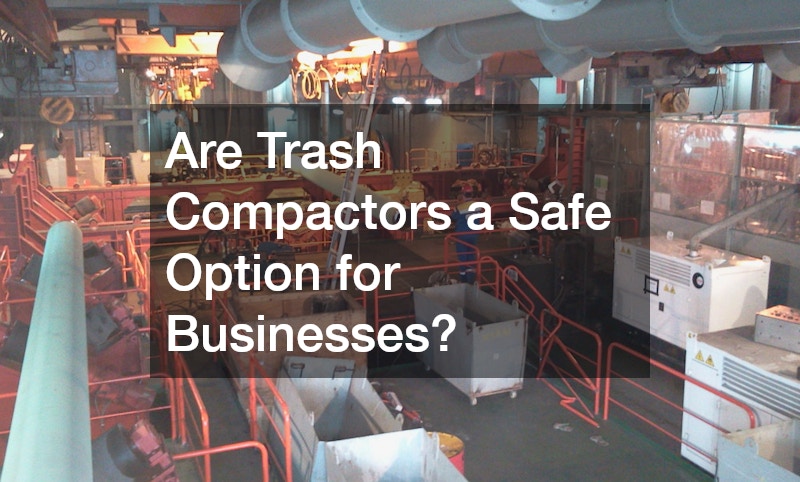Proper waste management is critical for maintaining a clean and efficient environment in commercial properties. Introducing trash compactors offers a viable solution to enhance waste management practices, allowing businesses to operate more efficiently.
Trash compactors have become essential in modern commercial settings by minimizing the volume of waste, which is critical in managing operational expenses. They offer a sustainable approach to handling waste, helping businesses reduce their environmental footprint.
This article aims to explore the various benefits of trash compactors for commercial properties, delving into their operational mechanisms, environmental impact, safety features, and necessary maintenance. By understanding these facets, commercial entities can make informed decisions about integrating compactors into their waste management strategies.
The Benefits of Trash Compactors for Commercial Properties
Cost Savings
Trash compactors can significantly reduce waste disposal costs for businesses by decreasing the frequency of waste collection services needed. By compressing waste, compactors enable properties to reduce the volume of trash transported, resulting in lower overall hauling fees.
As waste volume decreases, businesses enjoy reduced storage and handling expenses. This not only translates to direct savings but also optimizes operational efficiency as waste management becomes less cumbersome.
Furthermore, the use of trash compactors typically extends the lifespan of waste containers, leading to reduced expenditure on container replacements. These cost benefits are compelling reasons for businesses to consider compactors as a long-term investment.
Space Efficiency
Compactors allow businesses to make better use of available space by significantly reducing the volume of waste. This space efficiency is crucial in urban environments where real estate is at a premium.
By shrinking waste to a fraction of its original size, compactors free up valuable storage areas, enabling spaces to be utilized for more productive purposes. This restructuring can enhance the functionality of storage rooms and waste management areas within the property.
Moreover, the efficient use of space provided by compactors contributes to a more organized and tidy environment, reducing clutter and improving workplace aesthetics. Such advantages highlight the importance of integrating compactors into waste management plans for commercial properties.
How Do Trash Compactors Work?
Compacting Mechanism
Trash compactors use powerful hydraulic systems to compress waste materials into dense, manageable units. This mechanical action reduces the physical volume of waste, making it easier to store and transport.
The compacting process not only minimizes volume but also reduces odors and deters pests, creating a cleaner waste management solution. By applying significant pressure, compactors ensure that the waste is reduced to its smallest possible size.
This mechanism also facilitates easier segregation of waste if needed, allowing for more streamlined recycling and disposal processes. Understanding the compacting mechanism is essential for maximizing the benefits offered by trash compactors.
Types of Trash Compactors
Various models and types of trash compactors are available to meet different commercial needs. Stationary compactors are typically used for high-volume waste processing, while self-contained compactors are ideal for wet waste applications.
These options ensure that businesses can select a compactor type that aligns with their specific waste management requirements. With advances in technology, many modern compactors are equipped with user-friendly interfaces and enhanced operational capabilities.
Choosing the right type of compactor can drastically improve a business’s waste management efficiency. Additionally, investing in the appropriate compactor model is key to achieving optimal space and cost efficiencies.
Environmental Impact of Using Trash Compactors
Reducing Carbon Footprint
Using trash compactors can significantly reduce a business’s carbon footprint by minimizing the need for frequent waste transportation. As waste is compacted, fewer trips are needed for disposal, thereby cutting down on vehicle emissions.
This reduction in transportation requirements translates to less fuel consumption and reduced greenhouse gas emissions. For businesses aiming to improve their sustainability practices, incorporating compactors can be a crucial step.
Moreover, some compactors are now designed to operate more efficiently, consuming less energy while delivering superior performance. These factors collectively aid in diminishing the carbon footprint associated with waste management activities.
Promoting Recycling
Trash compactors facilitate recycling by segregating recyclable materials and reducing contamination in mixed waste streams. This separation is essential in maintaining the quality of recyclable materials, making them viable for processing.
By streamlining the recycling process, compactors play a central role in reducing landfill usage. This conservation of resources highlights the environmental advantages of incorporating compactors into waste management systems.
Moreover, the enhanced recycling facilitated by compactors underscores their importance in corporate social responsibility initiatives, showcasing a business’s commitment to sustainability. The collective impact of these practices contributes positively to environmental conservation efforts.
Are Trash Compactors a Safe Option for Businesses?
Safety Features
Modern trash compactors come equipped with a variety of safety features to ensure user safety during operations. These include emergency stop buttons, safety interlocks, and protective guards that prevent accidents.
Additionally, many compactors are designed with safety in mind, offering features like automatic shut-off and sensor-based operation to prevent mishaps. These features prioritize safety while maintaining operational efficiency.
By incorporating these safety mechanisms, compactors offer businesses a reliable waste management tool without compromising the well-being of employees. This balance of safety and functionality makes them a preferred choice for modern waste management needs.
Regulatory Compliance
Businesses must ensure that their trash compactors comply with industry standards and regulations to avoid penalties and operational disruptions. Compliance with regulations ensures that compactors operate efficiently while meeting safety and environmental guidelines.
By adhering to these standards, businesses demonstrate their commitment to responsible waste management practices. This compliance also enhances the business’s reputation and builds trust among stakeholders.
Regular inspections and maintenance are key to ensuring compliance, allowing businesses to operate within legal parameters. Staying informed about regulatory changes further helps in maintaining a proactive stance on compliance.




